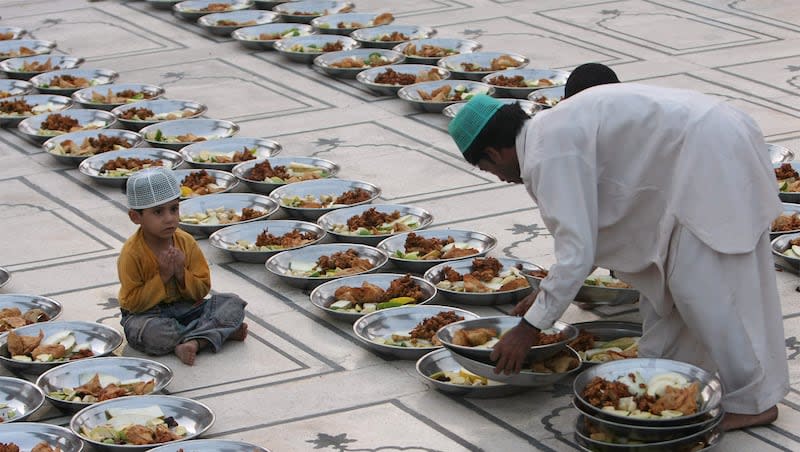How common is religious fasting?

This article was first published in the State of Faith newsletter. Sign up to receive the newsletter in your inbox each Monday night.
Four years ago, in the early days of the COVID-19 pandemic, I wrote about an effort to bring healing through a worldwide Good Friday fast, which united Catholics, evangelicals and members of The Church of Jesus Christ of Latter-day Saints, among others.
What’s stuck with me from that story is that fasting is a connection point between different faith groups, similar to prayer. And as with prayer, no two faith groups approach fasting the same way.
For example, a Catholic fast on Good Friday looks quite different than a Muslim fast during Ramadan.
Muslims are not supposed to eat or drink anything, including water, from sunrise to sundown, while Catholics can eat light snacks throughout the day and a light supper, like soup.
Regardless of how it’s done, fasting affects people in multiple ways. There are challenges — like hunger, obviously — but also opportunities, such as a chance to reflect on less fortunate communities who do not always have access to the food they need.
Twenty-one percent of U.S. adults say they “fast for certain periods during holy times,” according to a new Pew Research Center survey. That figure includes fully 80% of U.S. Muslims, 49% of Jews and 40% of Catholics.
Fasting is also common within smaller faith groups in the U.S., such as Buddhism and Hinduism, but Pew didn’t have enough survey participants from those groups to comfortably crunch the numbers.
“Various religions teach that fasting improves self-control, increases spiritual awareness or fosters empathy for the less fortunate,” Pew reported.
The potential benefits of fasting can come up in secular contexts, as well, such as when Arizona State men’s basketball coach Bobby Hurley spoke before the NCAA Tournament championship about fasting on game days.
“I don’t eat on game day. ... I want to make myself suffer and sacrifice before I have to go out and perform,” he said.
Fresh off the press
The top Supreme Court cases to follow this month
‘Reacher’ star talks faith — and his frustration with fellow Christians — in new interview
Scottie Scheffler is the world’s top golfer. He says faith is his defining trait
Why a rabbi is among those thanking John Calipari for his time at Kentucky
Term of the week: Eid Mubarak
Last week, Ramadan drew to a close with the holiday of Eid ul-Fitr. You might have noticed social media posts saying “Eid Mubarak” in recognition of the festivities.
Eid Mubarak means “blessed holiday,” according to the Islamic Networks Group. It’s used interchangeably with other celebratory phrases like “Happy Eid.”
You can also say Eid Mubarak or Happy Eid in late June when Muslims will celebrate Eid-ul-Adha. That’s the holiday that marks the end of the annual pilgrimage to Mecca, called the Hajj.
What I’m reading...
Ocean Grove, New Jersey, is not like other beach towns. Beach access there is controlled by a conservative Christian nonprofit, which prevents public sunbathing and water sports before noon on Sundays. This week, a state court will consider whether those faith-based restrictions on Sunday beach access can remain in place, according to The New York Times.
Last week, former President Donald Trump announced that, if he wins reelection, he will not sign a federal abortion ban and will, instead, maintain the status quo of states setting their own abortion policies. The Associated Press teased out how that announcement landed with conservative, anti-abortion Christians.
Among the many questions that may soon be added to Germany’s citizenship test are several about the Jewish community. The proposed questions are part of a broader push against antisemitism in the country, according to The Washington Post.
Pew Research Center’s recent look at Catholic views on Pope Francis, contraception and a number of other topics was fascinating to me.
Odds and ends
I’ll be in Pittsburgh later this week for Religion News Association’s annual conference. Follow me on X (@kelsey_dallas) to see what I’m learning during planned presentations on Islamophobia, Orthodox Christianity, faith-related foods and other topics.
Every time I think I’ve seen the funniest possible “Art But Make It Sports” post, I see an even funnier one.

